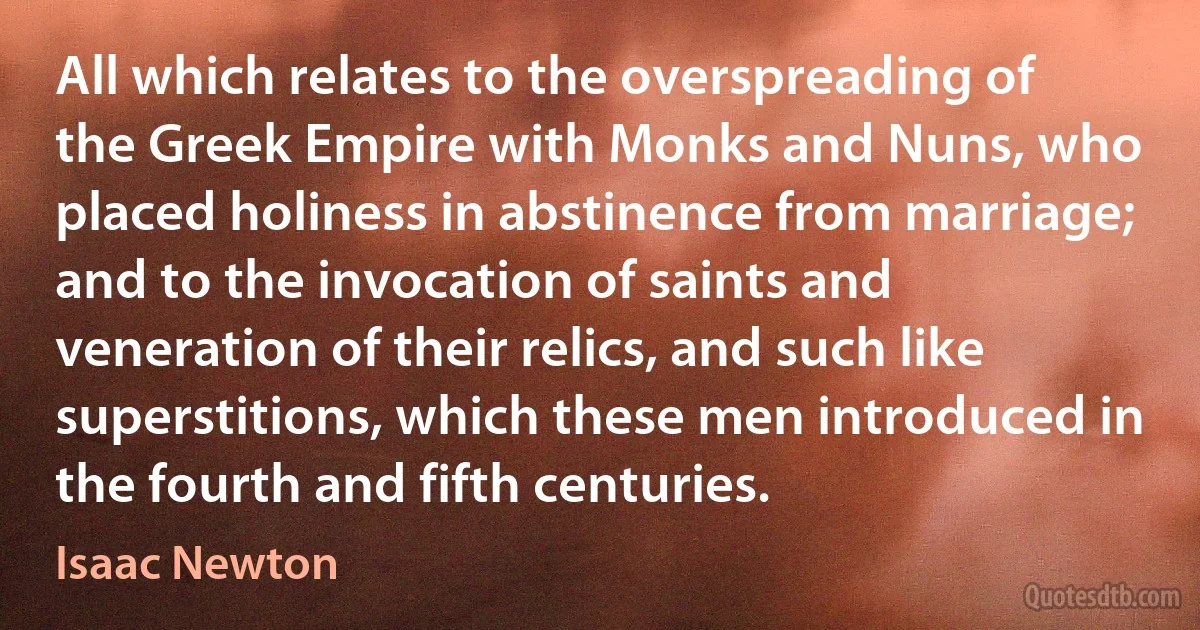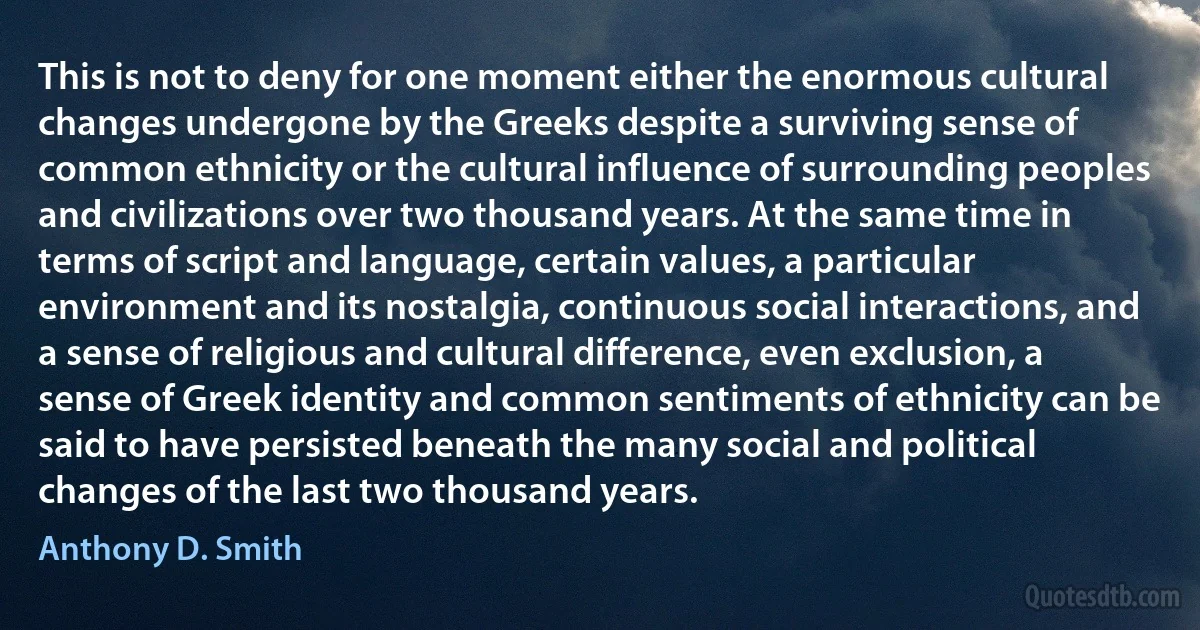Greek Quotes - page 27
Greek tragedy met her death in a different way from all the older sister arts: she died tragically by her own hand, after irresolvable conflicts, while the others died happy and peaceful at an advanced age. If a painless death, leaving behind beautiful progeny, is the sign of a happy natural state, then the endings of the other arts show us the example of just such a happy natural state: they sink slowly, and with their dying eyes they behold their fairer offspring, who lift up their heads in bold impatience. The death of Greek tragedy, on the other hand, left a great void whose effects were felt profoundly, far and wide; as once Greek sailors in Tiberius' time heard the distressing cry 'the god Pan is dead' issuing from a lonely island, now, throughout the Hellenic world, this cry resounded like an agonized lament: 'Tragedy is dead! Poetry itself died with it! Away, away with you, puny, stunted imitators! Away with you to Hades, and eat your fill of the old masters' crumbs!'

Friedrich Nietzsche
But perhaps the most significant factor in the turn to a Greek ethnicism, which resisted both the Turkish turban and the Latin mitre in the years before the fall of Constantinople, was the opposition of the urban populace, led by the Orthodox party, monks, and priests, to the wealthy urban classes and the Byzantine court. After the Ottoman conquest in 1453, recognition by the Turks of the Greek millet under its Patriarch and Church helped to ensure the persistence of a separate ethnic identity, which, even if it did not produce a ‘precocious nationalism' among the Greeks, provided the later Greek enlighteners and nationalists with a cultural constituency fed by political dreams and apocalyptic prophecies of the recapture of Constantinople and the restoration of Greek Byzantium and its Orthodox emperor in all his glory.

Anthony D. Smith
But his genetic and physical inference from cases of ethnic durability cannot account for the considerable variability, wide range and frequent absorptions and dissolutions of instances of ethnic affiliation, and the fact that many ethnies have undergone large-scale changes of culture and, in some cases, of demography. This is the case even in such a culturally long-lived example as the Greeks, where undoubted evidence of massive rupture of demographic continuity by the influx of Albanians and Slavs on the Greek mainland from the sixth to eighth centuries AD and of considerable, though not complete, culture change after the conversion to Orthodoxy, call into question the continuity and influence of a common ancient Greek biological and genetic inheritance on modern Greeks.

Anthony D. Smith
Greek Phanariot merchants and traders dominated the commerce of the Ottoman empire, utilizing their kinship networks and social and religious institutions to maximize not only their business and assets, but also their cultural capital. Diaspora Greeks became especially prominent from the eighteenth century in the development of printing and the press, and experienced a major intellectual revival in cities as far afield as Vienna, Venice, Odessa, Paris, and Amsterdam.

Anthony D. Smith
But the parallels go further, Greeks, Jews, and Armenians after their subordination to others and emigration or expulsion from their original homelands became Diaspora ethno-religious communities cultivating the particular virtues and aptitudes of their traditions. These included a respect for scholarship and learning, derived from constant study of sacred texts (and in the Greek case some of their ancient secular texts seen through religious filters); and hence a generally high status accorded to religious scholars and clergy within each enclave. Allied to this was a marked aptitude for literary expression-poetic, philosophical, legal, liturgical, linguistic, and historical.

Anthony D. Smith
We are for aiding our allies by sharing some of our material blessings with those nations which share in our fundamental beliefs, but we are against doling out money government to government, creating bureaucracy, if not socialism, all over the world. We set out to help 19 countries. We are helping 107 We spent 146 billion. With that money, we bought a 2-million-dollar yacht for Haile Selassie. We bought dress suits for Greek undertakers, extra wives for Kenya government officials. We bought a thousand TV sets for a place where they have no electricity.

Ronald Reagan
This evening, in the same square where, a millennium ago, the Roman governor, Pontius Pilate, handed Jesus over to the mob to be crucified, a group of men and women of all ages went to see the Greek, whom we all know as the Copt... He did not seek to join any particular religion, and no one tried to persuade him otherwise. The Copt believes only in the present moment and what he calls Moira - the unknown god, the Divine Energy...

Paulo Coelho
That the Macedonians were of Greek stock seems certain. The claim made by the Argead dynasty to be of Argive descent may be no more than a generally accepted myth, but Macedonian proper names, such as Ptolemaios or Philippos, are good Greek names, and the names of the Macedonian months, although differed from those of Athens or Sparta, were also Greek. The language spoken by the Macedonians, which Greeks of the classical period found unintelligible, appears to have been a primitive north-west Greek dialect, much influenced by the languages of the neighboring barbarians.

J.R. Hamilton
Superman is nothing more than a popular retelling of the Christ story, or Greek mythology. It's an archetype, watered down and made in vivid colors for twelve-year-old's mentality. It's pop mythology, which extends to the actor, then seeps over to a demand that that actor reflect the needs of the worshipers. The worship doesn't only go on in the temples - it goes on in the streets, and restaurants, in magazines. But, you know, I'm from New Jersey, I'm not from Olympus or Krypton, so back off 'cause I can't take the responsibility.

Christopher Reeve
Madame Fadeeff: "She was well brought up, well educated as a woman of the world, that is to say, very superficially. But as to serious and abstract studies, the religious mysteries of antiquity, Alexandrian Theurgy, ancient philosophies and philologies, the science of hieroglyphs, Hebrew, Samskrit, Greek, Latin, etc., she never saw them even in a dream. I can swear to it. She had not the least idea of the very alphabet of such things.... my niece spoke to me about them (the Masters of Wisdom), and that very fully, years ago. She wrote to me that she had seen and reknitted her connection with several of them before she wrote her Isis. Why should she have invented these personages? With what object ? and what good could they do her if they did not exist? Your enemies are neither wicked nor dishonest, I think; they are, if they accuse you of that, only idiotic.

Helena Petrovna Blavatsky
Of the many monks who had thronged the church, the dormitories and study-rooms, there were two, remarked by all, whom all were watching - Abbot Daniel and the teaching novice, Narziss, only recently entered in the novitiate, yet already, against all tradition, and because of his exceptional gifts, employed, in Greek especially, as a teacher. These two, the novice and the abbot, were respected and heeded by all the house. They were watched and aroused curiosity, admired and envied, slandered in secret. Ch. I.

Hermann Hesse
Clearly the Macedonians were in many respects Hellenized, especially on the upper levels of their society, as demonstrated by the excavations of Greek archaeologists over the past two decades. Yet there is much that is different, e. g., their political institutions, burial practices, and religious monuments.I will argue that, whoever the Macedonians were, they emerged as a people distinct from the Greeks who lived to the south and east. In time their royal court--which probably did not have Greek origins (the tradition in Herodotus that the Macedonian kings were descended from Argos is probably a piece of Macedonian royal propaganda)--became Hellenized in many respects, and I shall review the influence of mainstream Greek culture on architecture, art, and literary preferences.

Eugene N. Borza
First, Jesus was no simple peasant, but grew up in intimate contact with an urban and overwhelmingly Greek culture. And second, he intended to lead a spiritual regeneration of his people, based on a total repudiation of Greek culture. In all his preaching, he quotes from the Law and the Prophets, the old Hebrew scriptures. After seeing what the Greek culture had to offer, he went back to his Hebrew roots.

Jesus Christ
When I run into couples who recognize me, it's usually the women who are the most friendly. Once, at a Greek restaurant in New York City, a huge family was seated at a table nearby. Late in the evening, the grandmother stood up and said, ‘Tera, I love you! I watch you all night long!' Her daughter almost had a heart attack out of embarrassment. The grandma replied, ‘Honey, I may be old, but I'm not dead yet!'

Tera Patrick
Gold and the love of gain become to him his god, as the belly does to others. Wherefore the blessed Apostle, looking out on the deadly poison of this pest, not only says that it is a root of all kinds of evil, but also calls it the worship of idols, saying "And covetousness (which in Greek is called φιλαργυρία) which is the worship of idols." [Colossians 3:5] You see then to what a downfall this madness step by step leads, so that by the voice of the Apostle it is actually declared to be the worship of idols and false gods, because passing over the image and likeness of God (which one who serves God with devotion ought to preserve undefiled in himself), it chooses to love and care for images stamped on gold instead of God.

John Cassian


![If Vasari really knew the nature of the Greek style of which he speaks, he would deal with it differently in what he says. He compares it with Giotto, but what Giotto did is simple in comparison, because the Greek style is full of ingenious difficulties [= translation of Greek art historian Nicos Hadjinicolau] / full of deceptive difficulties. [= translation of Spanish art historians Xavier de Salas and Fernando María]. (El Greco)](https://cdn.quotesdtb.com/img/quotes_images_webp/56/el-greco-art-comparison-1007156.webp)
